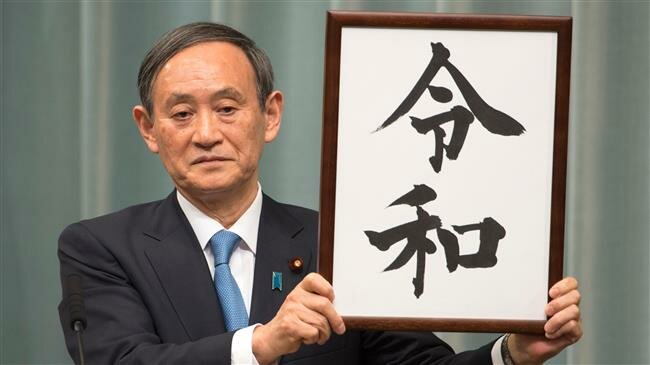Japan has announced the name of a new imperial era, set to begin on May 1, when Crown Prince Naruhito will take over the throne from his father following his historic abdication.

Following weeks-long speculation and top-secret discussions, Japan’s Chief Cabinet Secretary Yoshihide Suga said in televised news conference on Monday that the new era under Naruhito will be called “Reiwa,” meaning “order/command and peace/ harmony.”
“Reiwa” will replace the current “Heisei” era, which started in 1989 with the ascension of now 85-year-old Emperor Akihito to the throne and will end on April 30, when he hands the throne to his eldest son.
In Japan, a new era beings once an emperor dies and his reign – known as “gengo” -- ends. Things are, however, different this time, with Emperor Akihito set to become the first Japanese monarch to abdicate in favor of his heir in almost two centuries.
The outgoing emperor first indicated his intention to abdicate in 2016, citing health concerns.
Although the use of the Gregorian calendar has become widespread in the world’s third-largest economy, Japan is the only country still using Chinese-style imperial calendars.
So far, there have been four eras in its modern history: Meiji (1868-1912), Taisho (1912-1926), Showa (1926-1989) and current Heisei.
The era name is not just a way of counting years, but it ushers in a new chapter in Japan’s politics, history and culture.
“It’s a way of dividing history,” said Jun Iijima, a 31-year-old lawyer. “If you were just counting years, the Western system might be sufficient. But gengo gives a certain meaning to a historical period.”
This time, however, the characters of “Reiwa” were taken from the Manyoshu, an ancient collection of Japanese poetry, in a break with the tradition of selections from ancient Chinese texts.
The era name appears in places such as coins, calendars, official paperwork and newspapers.
The announcement came a month earlier so that offices and government agencies can update computer software and make other preparations to prevent glitches.
Many, including companies that manufacture private ink seals, which are commonly used in Japan to sign official documents, are expected to benefit from the change.
Financial traders hope the new era name will bolster the shaky market.

“Reiwa” echoes Abe’s ‘national pride’ agenda
Elaborating on the significance of the name’s selection, Prime Minister Shinzo Abe told a presser that “it is a collection which expresses our nation’s rich culture, which we should take pride in, along with our nation’s beautiful nature.”
“Reiwa” implies “culture is born and nourished when peopleís hearts are drawn beautifully together,” he added. “We believe this national character should be passed along to the next era.”
Koichi Nakano, a professor of political science at Sophia University, said Abe’s interpretation is reflective of his conservative agenda, which seeks to promote national pride.
It “echoes his calls for Japan to be proud of its roots and its tradition,” the professor added. “He wants Japan to be proud of their country and this was seen as an opportunity to boost that.”
LINK: https://www.ansarpress.com/english/10536
TAGS:































 online news tv
online news tv




